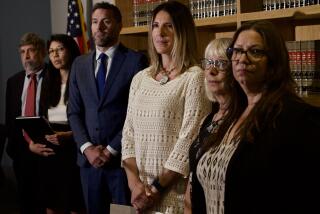Rhode Island teachers sue to be allowed Good Friday off as religious holiday
Anne McLaughlin has done the same thing on Good Friday for more than 30 years: She takes the day off and attends church, where she spends the afternoon reflecting on her faith.
But when the Rhode Island high school teacher requested April 3 off as one of two days of religious observance Cranston Public Schools employees are allowed each year, the answer was no. Instead, she was asked to provide documentation that church attendance was mandatory during the workday.
“I was shocked. Observing Good Friday is central to my Catholic identity,” McLaughlin, 56, said of the day Christians commemorate the crucifixion of Jesus. “Reflecting and praying from noon to 4 is something that I feel personally obligated to do.”
The teachers union two weeks ago sued the school district, alleging its response violated the civil rights of nearly 200 teachers and staff members who, like McLaughlin, asked for the day off for religious reasons but were denied. On Friday, a judge issued a preliminary injunction, allowing union members to take April 3 off this year without discipline. The union said the lawsuit would move ahead to finally settle the matter.
Lizabeth Larkin, president of the Cranston Teachers Alliance, said part of the dispute centered around the district allowing Jewish teachers and staffers to take off Rosh Hashana, among the holiest days for those of the Jewish faith, without proving anything. Requiring union members the right to Good Friday only with proof is “reckless,” she said, and creates a perception that teachers are not being treated equally.
Kevin Daley, the attorney representing the union, agreed, arguing that the collective bargaining agreement gives school employees the right to use Good Friday as one of their religious observance days — without documentation.
“Good Friday is one of the most holy days on the Christian calendar, second only to Easter,” he said.
Cranston school officials defended their decision, saying the crux of the debate is over interpretation of the union’s contract, which now says Cranston Public Schools employees may be granted the day off if their religious obligations “require attendance at religious services held during the school day.”
Judith Lundsten, school superintendent, said Rosh Hashana requires attendance at services during the workday, while Good Friday does not. “As a result, the request for the day off was denied for those who requested it,” she said.
Lundsten also noted that the school calendar was revised nine months ago, and religious days were no longer listed.
“Teacher assistants, technical assistants and bus aides sought to increase their hourly wage by giving up certain paid holidays,” she said in a statement. “Good Friday was one of those paid holidays; so to come back with this lawsuit is rather surprising.”
The lawsuit is being closely watched in Rhode Island, where nearly 45% of the population is Roman Catholic, according to the Public Religion Research Institute, making it the most Catholic state in the country.
Daley counters Lundsten’s argument, describing his clients as devout Christians who cannot observe Good Friday solely after school hours.
“They are required to remain in silence from 12 to 3, and they must also remain in deep prayer during that time,” he said. “It would be impossible for them to meet those obligations if they were in school. Those obligations are traditionally met by attending church.”
The Roman Catholic Diocese of Providence may not be of much help. While it maintains that Good Friday is “the most solemn of all the days in the Christian tradition,” Catholics are merely “encouraged” to make time for quiet prayer or to attend their parish service at 3 p.m. that day, the hour the Bible says Jesus died, said Father Jeremy Rodrigues, director of the diocesan Office of Divine Worship.
McLaughlin puts that in perspective, though.
“Even if someone observes Good Friday in a quiet corner of their house,” she said, “that’s their prerogative. I don’t believe it’s the duty of the employer to make that call.”
The lawsuit comes as public schools across the country grapple with how to determine which religious holidays to recognize on their calendars. This month, New York closed its public schools in observance of two Muslim holy days: Eid al-Fitr and Eid al-Adha.
But some districts, such as Montgomery County in Maryland, have avoided the topic altogether by eliminating the names of religious holidays from the school calendar.
In Cranston, multiple holidays, coupled with a mandatory day off for elections, disrupted the structure of the school year, said Raymond Votto, chief operating officer at the school district. The school committee already has added six additional days to the school year because of snow days, he said.
Daley contends that it comes down to a legal right.
“These religious observance days are days that these individuals have a contractual right to take,” he said. “If the school district is going to bargain for and include them in their agreement with teachers, then they have to abide by that when they figure out the school calendar.”
McLaughlin acknowledged that giving hundreds of staff members Good Friday off could cause “a logistical problem” for the district. But she said that didn’t change her thinking.
“I just don’t feel that it is right for me to abandon my personal obligations because of that,” she said.
Twitter: @parviniparlance
More to Read
Start your day right
Sign up for Essential California for news, features and recommendations from the L.A. Times and beyond in your inbox six days a week.
You may occasionally receive promotional content from the Los Angeles Times.







